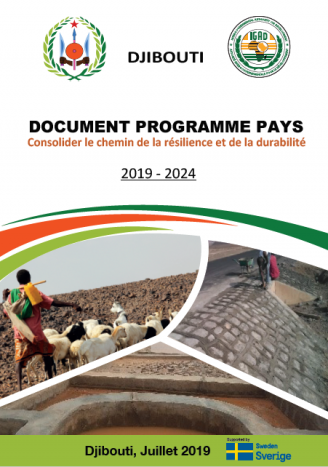Djibouti
Introduction
Djibouti is situated in the Horn of Africa and has a total surface area of about 123,000 km2 and a population of approximately 900,000, with around 80% of the total population living in urban areas. All of Djibouti territory is Arid and Semi-Arid Lands (ASALs). The country receives cumulative rainfall of approximately 150mm annually. Djibouti ASALs limit production systems and livelihoods due to ecological constraints such as erratic rainfall pattern; heavy showers that are lost as run-off; high rates of evapo-transpiration rates; highly competitive weeds; and low organic matter contents in soils.
Djibouti has a dual economy of a modern sector, based on income, co-existing with a large informal sector. Massive influx of Foreign Direct Investment (FDI) mainly from the Gulf countries, are destined for capital-intensive sectors and therefore do little job creation. These FDIs are part of the long-term strategy of the authorities to make Djibouti a regional platform of commercial, logistical and financial services.
According to a household survey carried by the statistics department in 2013, the incidence of extreme poverty in Djibouti was 21.1%, with Djibouti city having an incidence of 13.7% while the rest of the country had an incidence of 40.9%. Over the past decade, economic damages resulting from droughts have amounted to millions of Djibouti francs caused by climate changes. The droughts in 1983–85, 1991–92, 1998–99, 2010-2011 and recently in 2016 have resulted in between 37% and 62% of the livestock population perishing, mostly from starvation and lack of water. The fragile resource base in Djibouti rural areas is very sensitive to changes in climatic conditions, making pastoralists and agro-pastoralists highly vulnerable to climate change.
Following the adoption by the Djibouti Government in 2006 of the Hyogo Framework for Action, the Government of Djibouti promulgated a National Policy Act and an institutional framework for Disaster Risk Management (DRM). The institutional framework set up by the DRM’s Institutional Framework Decree is composed of three committees (Inter-ministerial Committee, Inter-sectoral Technical Committee, and Regional Disaster Management Committee) and the Secretariat of DRM as a permanent forum for management, coordination and enforcement and support programmes and actions under the authority of the Minister of the Interior.
The drought resilience programme is fully aligned with the existing national policies and initiatives, such as the Poverty Reduction Strategy Paper (INDS) and the Djibouti Vision 2035. Both documents engulf all CPP PIAs and have a goal to reduce poverty and enhance the resilience of the vulnerable groups.
The sector strategy papers, including the National Programme of Action for the Conservation of Biological Diversity, the Action Programme to Combat Desertification and the National Environmental Action Plan (NAPA) respond to the PIA 1 (natural resource management) and PIA 3 (support to livelihoods and basic services).
In addition to the above, the main existing instruments on related sectors on drought resilience include: National Strategy for Risk and Disaster Management; National Programme on Food Security; National Food Security and Investment Programme (PNISA); Water Master Plan; National Microfinance Strategy; National Environmental Action Plan (NAPA); National Strategy for Women; National strategy on decentralisation; Vision Djibouti 2035; Strategy of Accelerated Growth and Promotion of Employment (SCAPE) and National Fisheries Strategy.
A Strategic Coordination Committee, under the co-presidency of the Ministry of Economy and Finance responsible for Industry and the Ministry of Foreign Affairs and International Cooperation, was established by presidential decree No. 2015 -311 / PR / MEFI dated 03 November 2015. It includes all line ministries and technical and financial partners concerned, as well as the senior officials of the cooperation. The Strategic Coordination Committee is the platform designated to implement the recommendations of the annual forum for development assistance coordination. It works through sectoral groups and the Technical Secretariat has been placed under the authority of the Ministry of Foreign Affairs and International cooperation. The Secretariat is responsible for facilitating the proper functioning of the committee.
There is a subgroup of Resilience, Climate Change and Food Security, chaired by the Ministry of Agriculture, Water, Fisheries, Livestock and Marine Resources. Members are all line government institutions and development partners (see details in the organigram below).
The main mandate of the subgroup is exchange of information related to resilience, climate change and food security and coordinate all activities related to this theme. It has a mandate as well to prepare investment plans and mobilise resources accordingly. It held its first meeting on 30 April 2017.
The Government of Djibouti, under the leadership of the Ministry of Agriculture, Water, Livestock, Fisheries in charge of marine resources (IDDRSI focal point) favours a solid participatory approach (from bottom up) and has created a solid basis for implementation of the IDDRSI drought resilience strategy. In each ongoing or planned project and programme there is a steering committee of which the local communities are represented.
Platform Steering Committee Member: Mr. Warsama Osman – Technical Advisor to the Minister of Agriculture and SC Member
IDDRSI Focal Point: Mr. Ismael Elmi Habaneh – Technical Advisor to the Minister of Agriculture
News from Djibouti
Events in Djibouti
Resources


